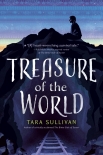Treasure of the World by Tara Sullivan (best romantic books to read txt) 📗

- Author: Tara Sullivan
Book online «Treasure of the World by Tara Sullivan (best romantic books to read txt) 📗». Author Tara Sullivan
And so I find myself starting the long, slow walk to school with Daniel beside me, his thin frame bundled in two sweaters to combat the early-morning cold.
The Cerro Rico, the mountain we live on, is huge. If you crane your neck upward, you can see past the brick-colored summit to the dry, pale sky beyond. Sometimes the road runs right along a cliff face and you can see down to the city of Potosí at the base of the mountain. If, instead of looking up or down, you stare at your feet, it feels like the red road stretches on forever. What you don’t see, no matter how you tip your head, is any green at all. This region of Bolivia is so high up there’s not a tree or a bush or a blade of grass anywhere. Just red and yellow and gray stripes of rock and the never-ending dust that slowly sifts into your clothes and cakes the inside of your mouth, claiming you, camouflaging you so that, if you stay here long enough, even you can’t tell where the mountain ends and you begin.
We go slowly, like I promised Mami, and we stop to rest a bunch of times, sitting on boulders along the side of the path whenever a coughing fit takes Daniel, until he catches his breath and can walk again. The way to school is mostly downhill. Even so, on a normal day, with Daniel walking full speed, it takes more than an hour to get there over the rough, rocky paths scraped across the mountain’s face and chipped out of its sides. Today, it takes longer.
Turning the last corner, I see our school below us, a tiny dust-colored building surrounded by a cinder-block wall, wedged into a crack between a cliff face and an ever-growing pile of slag from a nearby mine entrance. It crouches there, between the cliff and the cliff’s guts, looking like it might be crushed at any moment.
I hear the static hiss and scratch of Don Marcelino’s ancient speakers echo off the cliff. We’re going to be late! I dart a glance at Daniel. I know I promised Mami we’d go slowly, but we might make it in time if we run. We’re practically the same age. It’s not like he needs to be babied all the time.
“Think you can run?” I ask.
He nods.
When we get to the front, Daniel bends double trying to catch his breath. I feel a little bad for pushing him. Grabbing a rock from the ground, I tap it against the peeling blue paint of the tall metal gates.
Doña Inés, one of the helpers, opens the gate. It creaks and groans on its dust-caked hinges. She smiles when she sees Daniel.
“Welcome back,” she whispers, one hand on her huge belly. Soon it will be another helper who opens the door because Doña Inés will be having her baby. We duck around the door and scamper into the courtyard. Doña Inés shuts the door softly behind us.
The rest of the school is already lined up by age in the tiny packed-earth courtyard. Don Marcelino stoops at the base of the flagpole, twisting the wires at the back of his battered stereo and muttering. For once, I’m glad the technology is misbehaving. It gives us the chance to sneak in late without anyone noticing.
Daniel and I both hurry to join the end of the line for twelve-year-olds. Even though I’m older by almost eleven months, they put us in the same class. I try not to let it bother me too much. Daniel steps into place behind me, and I shoot him a grin over my shoulder that we made it. Daniel smiles back, his teeth a flash of white in his skinny face.
Just then, Don Marcelino wins his battle with the ancient speaker and the opening strains of the national anthem blare at us.
As we all straighten to attention and sing along, saluting the flag, my eyes wander to the rows on my left. The messy gaggle of four-, five-, and six-year-olds is a huge, unmanageable pack. There are at least thirty or forty of them, still not all facing forward even now that the music is playing. But then, year by year, the rows get shorter. By the row of twelve-year-olds, where we’re standing, there are only six of us. Victor, Juanillo, Emily, Wilma, and Álvaro are standing to my right: they’re the only five students in the whole school who are older than me.
The music cuts off and Don Marcelino addresses us, like he does every morning, standing tall in his dark slacks and patterned wool sweater. His voice booms and his square-framed glasses make his face look very impressive, but still I ignore him. I don’t need to listen to Don Marcelino because all he ever does is talk about big things: pride, patriotism, work ethic. I don’t come to school to learn about the big things. I know those from home.
Pride is what makes you not tell people when your papi hits your mami.
Patriotism is what makes you not curse Bolivia when you get so tired of living on this one mountain that you could scream.
And work ethic is something a child of six from the Cerro Rico knows more about than Don Marcelino ever will. He comes up here every day in a pickup from the city of Potosí. He’s not a miner.
I tune him out, letting my eyes lift over the solid walls of the school to the high cliffs stretching beyond them, wondering whether today will be the day when I finally learn something that will lead me off this mountain and toward a future I actually want.
“Thank God that’s over,” mutters Daniel as we get our mugs of thinned-down oatmeal and go sit in a corner together after Don Marcelino’s speech. The younger kids wait in line, impatient for the food. One of the few benefits of being older is eating





Comments (0)